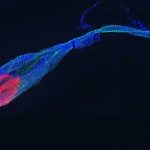Lien vers Pubmed [PMID] – 32034426
Lien DOI – 10.1007/s00262-020-02503-0
Cancer Immunol Immunother 2020 May; 69(5): 703-716
Cancer is one of the main causes of mortality worldwide and a major public health concern. Among various strategies, therapeutic vaccines have been developed to stimulate anti-tumoral immune responses. However, in spite of extensive studies, this approach suffers from a lack of efficacy. Recently, we designed the MAG-Tn3 vaccine, aiming to induce antibody responses against Tn, a tumor-associated carbohydrate antigen. The Tn antigen is of interest because it is expressed by several adenocarcinomas, but not normal cells. The fully synthetic glycopeptide vaccine MAG-Tn3 is composed of four arms built on three adjacent Tn moieties associated with the tetanus toxin-derived peptide TT830-844 CD4+ T-cell epitope. This promiscuous CD4+ T-cell epitope can bind to a wide range of HLA-DRB molecules and is thus expected to activate CD4+ T-cell responses in a large part of the human population. The MAG-Tn3 vaccine was formulated with the GSK-proprietary immunostimulant AS15, composed of CpG7909, MPL, and QS21, which has been shown to stimulate both innate and humoral responses, in addition to being well tolerated. Here, seven patients with localized breast cancer with a high-risk of relapse were immunized with the MAG-Tn3 vaccine formulated with AS15. The first results of phase I clinical trial demonstrated that all vaccinated patients developed high levels of Tn-specific antibodies. Moreover, these antibodies specifically recognized Tn-expressing human tumor cells and killed them through a complement-dependent cytotoxicity mechanism. Overall, this study establishes, for the first time, the capacity of a fully synthetic glycopeptide cancer vaccine to induce specific immune responses in humans.



